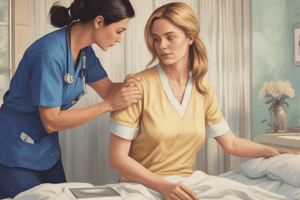Podcast
Questions and Answers
What does asepsis refer to in nursing?
What does asepsis refer to in nursing?
During a dressing change, what is a crucial step to prevent infection?
During a dressing change, what is a crucial step to prevent infection?
What is a critical skill for practical nurses in terms of patient care?
What is a critical skill for practical nurses in terms of patient care?
What is crucial in medication administration for practical nurses?
What is crucial in medication administration for practical nurses?
Signup and view all the answers
In terms of blood pressure, what is an essential skill needed by practical nurses?
In terms of blood pressure, what is an essential skill needed by practical nurses?
Signup and view all the answers
Which step is essential during a dressing change to maintain a sterile environment?
Which step is essential during a dressing change to maintain a sterile environment?
Signup and view all the answers
What is a crucial step in blood pressure measurement that practical nurses should perform?
What is a crucial step in blood pressure measurement that practical nurses should perform?
Signup and view all the answers
What is a key aspect of urinary elimination care that practical nurses should focus on?
What is a key aspect of urinary elimination care that practical nurses should focus on?
Signup and view all the answers
When administering medication, what should practical nurses verify before giving it to the patient?
When administering medication, what should practical nurses verify before giving it to the patient?
Signup and view all the answers
What should practical nurses do to assist patients with bowel elimination care?
What should practical nurses do to assist patients with bowel elimination care?
Signup and view all the answers
Which skill is crucial for practical nurses to master in asepsis & dressing change?
Which skill is crucial for practical nurses to master in asepsis & dressing change?
Signup and view all the answers
What is an essential step when administrating medication to a patient?
What is an essential step when administrating medication to a patient?
Signup and view all the answers
Study Notes
Nursing Skills for Practical Nursing
Practical nursing skills are essential for nurses working in different healthcare settings. In this article, we will discuss the nursing skills required for practical nursing, focusing on asepsis & dressing change, medication administration, urinary elimination care, bowel elimination care, blood pressure, vital signs, and pain assessment.
Asepsis & Dressing Change
Asepsis refers to the prevention of infection during medical procedures. In the context of nursing, it involves maintaining a sterile environment to prevent infection. This includes using sterile gloves, gowns, and equipment, as well as adhering to strict hand hygiene procedures.
Dressing changes involve removing old dressings and applying new ones to wounds. Proper aseptic technique is crucial during this process to prevent infection. The nurse should follow these steps:
- Clean hands with soap and water or an alcohol-based hand sanitizer.
- Don clean gloves and a gown, if necessary.
- Assess the wound and remove old dressings.
- Clean the wound with a saline solution.
- Apply a new dressing and secure it in place.
- Wash hands thoroughly.
Medication Administration
Medication administration is a critical skill for practical nurses. It involves accurately measuring and administering medications to patients according to their prescriptions. This includes understanding the principles of medication administration, such as:
- Checking the patient's identity.
- Consulting the medication record.
- Checking the label on the medication.
- Checking the patient's vital signs.
- Verifying the medication's expiration date.
- Administering the medication according to the prescribed route, dosage, and frequency.
Urinary Elimination Care
Urinary elimination care involves assisting patients with catheterization, urinary collections, and toileting. This includes:
- Assessing the patient's bladder capacity.
- Assisting with catheterization if necessary.
- Monitoring the urine output.
- Encouraging the patient to drink adequate fluids.
- Assisting the patient with toileting or bedpan use.
Bowel Elimination Care
Bowel elimination care involves assisting patients with bowel movements, including:
- Encouraging a high-fiber diet.
- Assisting with bowel movement positioning.
- Emptying bedpans or bedside commodes.
- Cleaning the patient's perineal area with a clean cloth.
Blood Pressure
Measuring blood pressure is an essential skill for practical nurses. This involves:
- Explaining the procedure to the patient.
- Positioning the patient appropriately.
- Using a blood pressure cuff with the correct cuff size.
- Inflating the cuff to the appropriate pressure.
- Listening for the blood pressure sounds.
- Recording the readings and comparing them to the patient's previous results.
Vital Signs
Vital signs refer to the body's normal functions, including temperature, pulse, respiratory rate, and blood pressure. Monitoring vital signs is crucial for detecting early signs of illness or complications. Practical nurses should be proficient in:
- Taking an accurate temperature reading.
- Palpating the pulse.
- Listening for the respiratory rate.
- Measuring blood pressure.
Pain Assessment
Pain assessment is a key skill in nursing. Practical nurses should be able to:
- Assess pain levels using a pain scale.
- Identify potential sources of pain.
- Administer pain medications if necessary.
- Monitor the patient's response to pain management.
In conclusion, practical nursing skills are essential for nurses working in various healthcare settings. These skills include asepsis & dressing change, medication administration, urinary elimination care, bowel elimination care, blood pressure measurement, vital signs monitoring, and pain assessment. By mastering these skills, practical nurses can provide high-quality care and support to their patients.
Studying That Suits You
Use AI to generate personalized quizzes and flashcards to suit your learning preferences.
Description
Learn about essential practical nursing skills such as asepsis & dressing change, medication administration, urinary elimination care, bowel elimination care, blood pressure measurement, vital signs monitoring, and pain assessment. This article provides detailed insights into each skill to help nurses provide high-quality care to their patients.




